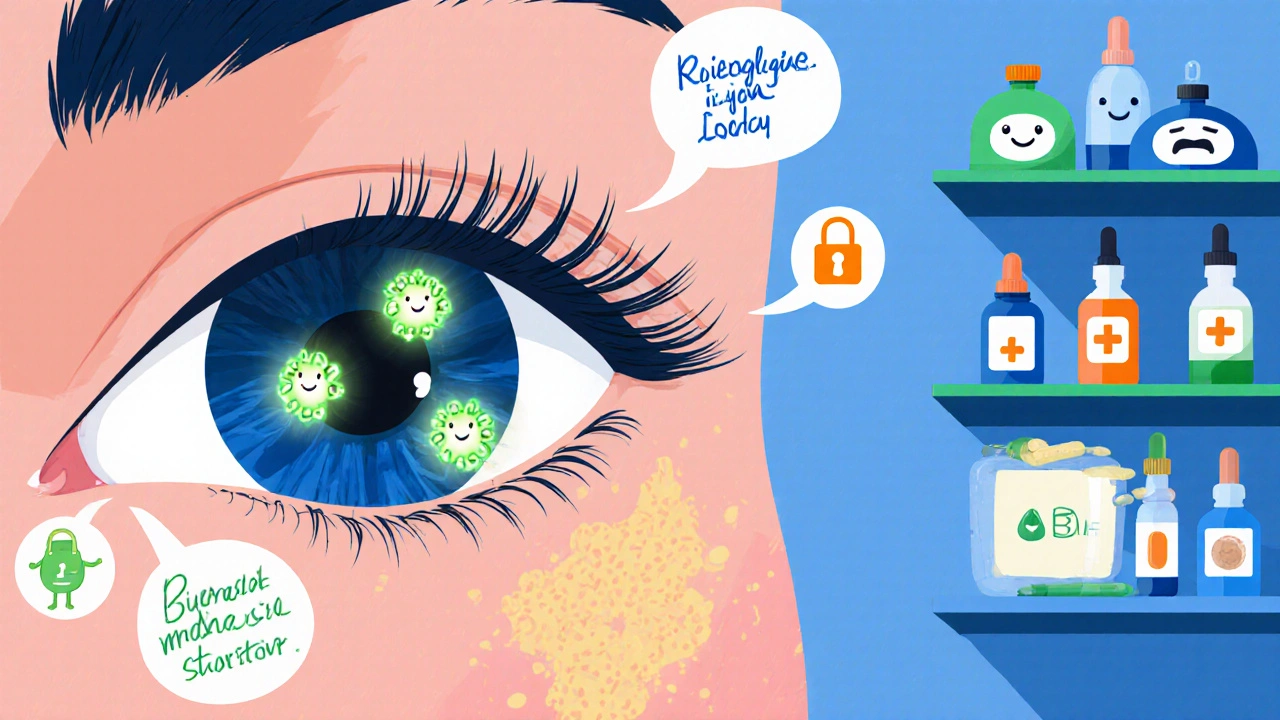Eyelash Growth Cost Calculator
Compare Your Options
Calculate the actual monthly costs for different eyelash growth products based on your usage pattern.
When it comes to boosting eyelash length and thickness, many people first think of Careprost. But the market is filled with other options, from prescription drops to over‑the‑counter serums. This guide breaks down Careprost, its active ingredient Bimatoprost, and the most common alternatives so you can decide which product fits your goals, budget, and safety standards.
Key Takeaways
- Careprost contains 0.03% Bimatoprost, the same FDA‑approved ingredient found in Latisse.
- Prescription prostaglandin analogs (Latisse, Lumigan, Xalatan, Travatan) share similar mechanisms but differ in cost and availability.
- OTC serums often rely on peptides, biotin, or minoxidil, delivering slower results with fewer side effects.
- Safety profile: Bimatoprost carries a low risk of eye irritation and darkening of the iris; non‑prescription serums usually have milder side effects.
- Cost per month ranges from $30 for DIY Careprost kits to $300+ for branded Latisse.
Careprost is a Bimatoprost‑based eye drop marketed primarily as a cosmetic solution for longer, fuller eyelashes. Though not FDA‑approved for this use, it is often sourced from compounding pharmacies.
Bimatoprost belongs to the prostaglandin analog class, originally developed for glaucoma treatment. Its off‑label use for eyelash growth was discovered when patients using the drug for eye pressure noticed longer lashes.
How Bimatoprost Works
The prostaglandin pathway controls hair follicle cycling. Bimatoprost binds to prostaglandin‑F receptors on the eyelash follicle, extending the anagen (growth) phase and increasing the number of hairs that emerge per follicle. This results in noticeable length, thickness, and darkness within 8‑12 weeks of consistent use.
Top Prescription Alternatives
While Careprost offers a similar formulation to the FDA‑approved eye drop, several prescription options also contain prostaglandin analogs. Below is a quick snapshot.
| Brand | Active Ingredient | FDA Status for Eyelash Growth | Typical Dosage | Cost per ml (USD) | Availability |
|---|---|---|---|---|---|
| Careprost | Bimatoprost 0.03% | Off‑label | One drop nightly | $30-$45 | Compounding pharmacy / online |
| Latisse | Bimatoprost 0.03% | Approved | One drop nightly | $250-$300 | Prescription only (US) |
| Lumigan | Bimatoprost 0.01% | Off‑label | Two drops (conjunctiva), not marketed for lashes | $130-$170 | Prescription (glaucoma) |
| Xalatan | Travoprost 0.004% | Off‑label | One drop nightly | $150-$190 | Prescription (glaucoma) |
| Travatan | Travoprost 0.004% | Off‑label | One drop nightly | $140-$180 | Prescription (glaucoma) |
Notice that the cost gap between Careprost and Latisse is significant, while the efficacy is virtually identical because both rely on the same 0.03% Bimatoprost concentration.
Non‑Prescription (OTC) Alternatives
For users hesitant to get a prescription, a growing number of over‑the‑counter serums claim to boost lashes using peptides, vitamins, or minoxidil. While they avoid the regulatory hurdles of prostaglandin analogs, results tend to be slower and less dramatic.
- Biotin supplements: A B‑vitamin that supports keratin production. Typical dosage is 5,000µg daily; however, evidence for eyelash growth is anecdotal.
- Minoxidil (2% or 5% topical solution) is FDA‑approved for scalp hair loss and is sometimes repurposed for lashes. Applied sparingly once daily, it can thicken lashes after 12-16 weeks but carries a risk of irritation.
- Peptide‑rich serums (e.g., hexapeptide‑11, copper‑tripeptide‑1): These aim to stimulate follicle activity. Results vary widely, and concentrations are rarely disclosed.
- Eyelash extensions: Not a topical agent, but a cosmetic method that provides instant length. Requires professional application and periodic refilling.

Safety and Side‑Effect Profile
Understanding the risk spectrum helps you weigh convenience against potential complications.
| Category | Typical Side Effects | Severity |
|---|---|---|
| Prescription Bimatoprost (Latisse, Careprost) | Eye redness, itching, darkening of the iris, darkening of peri‑ocular skin | Mild to moderate; usually reversible after discontinuation |
| Other Prostaglandin Analogs (Lumigan, Xalatan, Travatan) | Similar to Bimatoprost but higher incidence of ocular irritation due to preservatives | Moderate |
| OTC Peptide or Biotin Serums | Minimal - occasional mild skin irritation | Low |
| Minoxidil | Dryness, itching, potential eyelash loss if over‑applied | Low to moderate |
One unique concern with Bimatoprost‑based drops is permanent iris darkening. If you have light-colored eyes and value their hue, discuss this with your doctor before starting.
Cost Considerations
Budget often decides between branded Latisse and DIY Careprost kits. Below is a rough monthly cost breakdown (based on typical dosing of one drop nightly).
- Careprost kit (10ml): $30-$45, lasts ~300 days → approx. $0.10‑$0.15 per day.
- Latisse (5ml): $250-$300, lasts ~150 days → approx. $1.70‑$2.00 per day.
- Lumigan (5ml): $130-$170, lasts ~150 days → approx. $0.90‑$1.10 per day (but needs prescription).
- OTC peptide serum (30ml): $70-$120, lasts ~180 days → approx. $0.40‑$0.70 per day.
- Biotin supplement (30capsules): $15-$25, daily dose for 30 days → $0.50‑$0.80 per day.
Choosing the Right Option for You
Ask yourself these three questions before buying:
- Do I need a rapid, clinically proven result? → Bimatoprost (Latisse or Careprost) wins.
- Am I comfortable obtaining a prescription and paying a premium? → Latisse may be worth the convenience of a licensed pharmacy.
- Do I prefer a lower‑risk, over‑the‑counter approach even if it takes longer? → Biotin, peptide serums, or minoxidil are safer bets.
Remember, consistency is key. Missing nights can reduce results by up to 30%.
How to Use Bimatoprost Safely
- Wash your hands thoroughly.
- Remove contact lenses (if you wear them). Place them in a clean case.
- Pull the lower eyelid gently to form a small pocket.
- Instill one drop of the solution at the base of the pocket, not directly on the lashes.
- Close your eye for a few seconds, then blink a few times to spread the drop.
- Wait at least 5 minutes before applying any other eye product.
- Replace the cap tightly and store in a cool, dry place.
Follow these steps every night for at least 8 weeks before judging the outcome.

Potential Pitfalls & How to Avoid Them
- Contamination: Use a new sterile bottle each month; re‑using old kits can introduce bacteria.
- Over‑application: More drops do NOT speed up growth; they increase irritation risk.
- Mixing products: Avoid layering a peptide serum over Bimatoprost unless a dermatologist approves.
- Allergic reaction: Stop use immediately if you experience severe redness, swelling, or pain and seek medical advice.
Summary of Pros & Cons
| Option | Pros | Cons |
|---|---|---|
| Careprost | Very low cost, same active ingredient as Latisse, easy online ordering | Off‑label, quality varies by supplier, no formal FDA oversight |
| Latisse | FDA‑approved, consistent manufacturing, insurance may cover | High price, prescription required in US, limited overseas |
| Lumigan/Xalatan/Travatan | Available via prescription, proven glaucoma safety record | Not marketed for lashes, lower Bimatoprost concentration (Lumigan) or different analogs, higher cost than Careprost |
| OTC Peptide Serum | No prescription, generally gentle on eyes | Results slower, efficacy less documented |
| Biotin Supplement | Inexpensive, supports overall hair health | Minimal direct impact on eyelashes, benefit largely anecdotal |
| Minoxidil | Strong evidence for hair follicle stimulation | Potential dryness, not specifically formulated for eyes, off‑label use |
Final Thoughts
If you want the fastest, most clinically backed results, Bimatoprost‑based drops are the clear winner. Careprost gives you that power at a fraction of the price, but you trade regulatory certainty for cost savings. For those who prefer a gentler, non‑prescription route, peptide serums, biotin, or even minoxidil can still improve lash density over time, albeit more modestly.
Frequently Asked Questions
Is Careprost legal to use for eyelash growth?
Careprost is legal as a compounding pharmacy product, but it is not FDA‑approved for cosmetic eyelash use. Its active ingredient, Bimatoprost, is FDA‑approved for glaucoma and for Latisse (eyelash growth). Users should purchase from reputable sources and understand the off‑label nature.
How long does it take to see results?
Most people notice longer lashes after 8-12 weeks of nightly application. Full results can appear around 16 weeks. Consistency matters more than dosage.
Can I use Careprost and Latisse together?
No. Both contain the same active ingredient, so using them together offers no extra benefit and doubles the risk of irritation. Choose one regimen and stick with it.
What are the most common side effects?
Redness, itching, and darkening of the iris are the most frequently reported effects. These usually reverse after you stop using the drops, except for iris color change, which can be permanent.
Are there any contraindications?
People with active eye infections, uncontrolled glaucoma, or known hypersensitivity to prostaglandin analogs should avoid Bimatoprost drops. Pregnant or nursing women should consult a doctor before use.


Lyle Mills
October 17, 2025 AT 01:41The pharmacodynamics of Bimatoprost hinge on prostaglandin‑F receptor agonism which extends the anagen phase of the eyelash follicle. This mechanism is shared across Careprost Latisse Lumigan and Travatan albeit at varying concentrations. Off‑label use of Careprost leverages the same 0.03% formulation as Latisse so efficacy parity is expected. Cost differentials are driven by compounding margins and regulatory overhead. Clinical data indicates visible lash elongation within eight to twelve weeks of nightly dosing. Patients should monitor for ocular irritation and iris hyperpigmentation as documented adverse events. Adherence remains the primary driver of outcome variability. The risk‑benefit profile favors Careprost for budget‑conscious users lacking prescription access.
Barbara Grzegorzewska
October 17, 2025 AT 21:08Honestly this guide is a masterpiece of cosmetic pharmacology, defnitely the gold standard for lash enthusiasts! The way it dissects Careprost vs Latisse feels like a runway review of the beauty biotech industry, dripping with glamour and unapologetic detail. I’m practically swooning over the cost breakdown – it’s like watching a luxury brand slash prices for its elite fans. Everyone should bow down to the author’s meticulous research, because nothing else even comes close to this level of sophistication.
Nis Hansen
October 18, 2025 AT 16:34The allure of longer lashes taps into a deep-rooted cultural narrative about beauty and power. When we evaluate Careprost against its counterparts, we must first acknowledge the biochemical uniformity that underpins their efficacy. Bimatoprost, regardless of brand, activates the prostaglandin‑F receptor cascade, thereby prolonging the growth phase of the hair follicle. This pharmacologic action translates into measurable increases in lash length, thickness, and even pigmentation after consistent nightly application. However, the divergence in cost and regulatory status creates a stratified market that serves distinct consumer segments. Prescription‑only products like Latisse offer the reassurance of FDA approval and standardized manufacturing, which can be crucial for risk‑averse users. Conversely, compounding solutions such as Careprost deliver comparable outcomes at a fraction of the price, albeit with variability in purity and sterility that users must vigilantly assess. Clinical trials have shown that a 0.03% concentration yields optimal results within eight to twelve weeks, a timeline that aligns with the psychological reward cycle of habit formation. Patients who neglect adherence often experience sub‑optimal growth, underscoring the importance of routine in therapeutic success. Side‑effects, while generally mild, include ocular irritation, temporary darkening of the iris, and peri‑ocular hyperpigmentation, which may be irreversible in some cases. The risk of permanent iris coloration is particularly salient for individuals with lighter eye colors, demanding informed consent before initiation. From an economic perspective, the per‑day cost of Careprost can be calculated as under two cents, whereas Latisse approaches two dollars, a disparity that can accumulate dramatically over a year. This financial burden may influence patient compliance, as out‑of‑pocket expenses are a common barrier to sustained treatment. Moreover, the ethical considerations of off‑label use invite debate about the balance between accessibility and regulatory oversight. Ultimately, the choice between Careprost and other Bimatoprost alternatives reflects a personal calculus of cost, convenience, safety, and desired speed of results. Users who prioritize rapid, clinically validated outcomes may favor Latisse, while those willing to navigate the nuances of compounding may find Careprost an economical and effective path to fuller lashes.
Fabian Märkl
October 19, 2025 AT 12:01Great summary! 🎉 I’ve tried both and can confirm the timeline you mentioned feels spot on for most people. I love that Careprost offers a budget‑friendly route, especially when you’re just starting out. Just remember to keep the bottle pristine – contamination can ruin the whole experience. 👍 Keep an eye on any redness and you’ll be set for those fluttery lashes.
Avril Harrison
October 20, 2025 AT 07:28Honestly, I didn’t realize the cost gap was that huge until I did the math. It’s wild how a DIY kit can be so cheap compared to Latisse.
Natala Storczyk
October 21, 2025 AT 02:54What?!? The price disparity is an outrage!!! How can a multinational corporation charge $300 for a drop of liquid?!? It’s a blatant exploitation of beauty standards!!! People deserve affordable options!!!
nitish sharma
October 21, 2025 AT 22:21Esteemed readers, it is imperative to approach eyelash enhancement with both scientific rigor and disciplined consistency. The pharmacological principles remain constant, yet the commitment of the user dictates the ultimate success. By adhering to a structured nightly regimen, one can harness the full potential of Bimatoprost while minimizing adverse events. Let us proceed with measured optimism and unwavering dedication.
Rohit Sridhar
October 22, 2025 AT 17:48Exactly! A disciplined routine is the backbone of any transformation, but remember to stay flexible – if you notice irritation, pause and consult a professional. Consistency doesn’t mean stubbornness; it means smart persistence. Keep track of your progress, maybe with photos, and celebrate each small gain. You’ll be amazed at how steady effort compounds over weeks.
Sarah Hanson
October 23, 2025 AT 13:14The key takeaway: consistency beats cost when side‑effects are managed.
Nhasala Joshi
October 24, 2025 AT 08:41Do you realize the pharma giants are silently funding the research to keep us hooked on pricey prescriptions? 🤔💊 The hidden agenda is clear – keep the profit stream flowing while we scramble for cheaper alternatives. Stay vigilant, friends! 🌐
kendra mukhia
October 25, 2025 AT 04:08Let’s set the record straight – the science behind prostaglandin analogues is non‑negotiable. Anyone claiming otherwise is simply misinformed. The data unequivocally shows that a 0.03% concentration is the sweet spot, and any deviation compromises efficacy.
Bethany Torkelson
October 25, 2025 AT 23:34Wow, such arrogance! Your “non‑negotiable” stance ignores the real‑world variations users face. Not everyone can afford the premium price, and your tone alienates those seeking alternatives.
Grace Hada
October 26, 2025 AT 18:01Philosophically, beauty is a construct; aggressively chasing it with chemicals reflects modern nihilism.
alex montana
October 27, 2025 AT 13:28The statement is profound; however, it's also simplistic.
Wyatt Schwindt
October 28, 2025 AT 08:54Stay consistent.
RJ Samuel
October 29, 2025 AT 04:21Honestly, I think the whole hype around eyelash drugs is overrated – a good mascara does the trick just as well, if not better.
Emily Rankin
October 29, 2025 AT 23:48In the grand tapestry of self‑care, each drop of Bimatoprost is a thread that weaves confidence into our daily narrative. Embrace the journey, celebrate the small victories, and remember that true beauty radiates from within, amplified by the tools we choose.